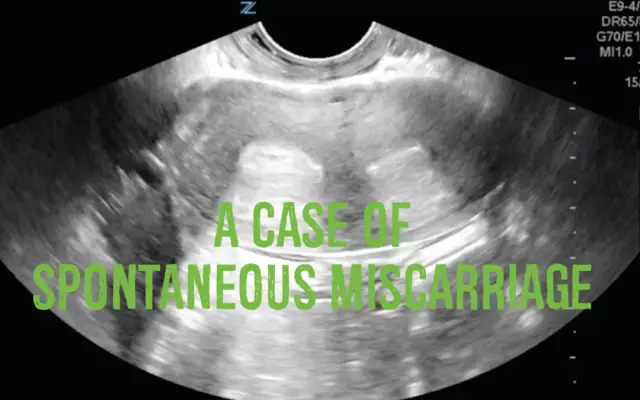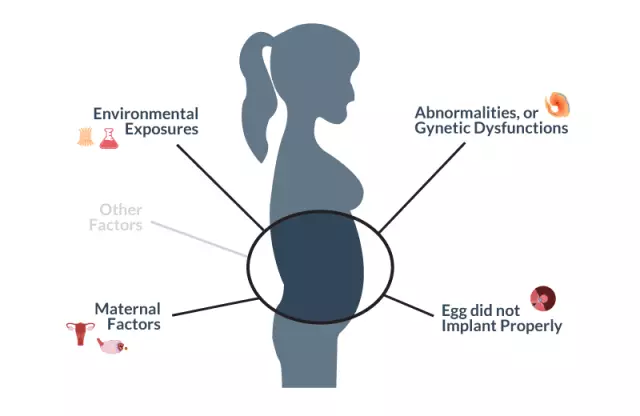- Author Rachel Wainwright wainwright@abchealthonline.com.
- Public 2023-12-15 07:39.
- Last modified 2025-11-02 20:14.
Early spontaneous miscarriage

Early spontaneous miscarriage - termination of pregnancy in the first 20-22 weeks. This period is due to the degree of development of the fetus. It is by 20-22 weeks of pregnancy that the weight of the fetus reaches 500 g, and its organ systems are sufficiently developed for independent functioning. Statistics show that it is practically impossible to save the life of a child born before 20-22 weeks. What are the causes of early miscarriage? How to determine the onset of miscarriage? Is it possible to maintain a pregnancy with symptoms of miscarriage? Is it worth keeping a pregnancy when a miscarriage begins?
Early spontaneous miscarriage: the main symptoms of the condition
According to statistics, up to 20% of all pregnancies end in miscarriages, including 80% of all miscarriages occur in the early stages. Many miscarriages occur at 4-5 weeks, when the woman is not yet aware of her condition. The symptoms of an early spontaneous miscarriage are similar to those of painful menstruation:
- Drawing, stitching, cutting pain in the lower abdomen;
- Back pain in the lumbar region;
- Stitching sensations in the ovaries;
- Bloody discharge or profuse bleeding;
- Blood clots;
- Blood discharge on any day of the cycle;
- Scanty menstrual bleeding.
At an early stage, a woman may already feel the subjective symptoms of pregnancy, which include:
- Swelling of the breasts;
- Nausea, vomiting;
- Drowsiness, apathy, mental instability;
- Increased appetite.
A decrease in the manifestation of these signs can also indicate an early spontaneous miscarriage. Therefore, it is extremely important for every woman with the lowest probability of pregnancy to carry out early diagnosis (home tests to determine pregnancy of high sensitivity) to prevent this condition.
What is the danger of an early spontaneous miscarriage? The main risks to a woman's health and life are that a miscarriage that has begun may not end. That is, at an early date, for certain reasons, the death of the fetus and its partial rejection occur. However, the process is not completed, and parts of the ovum remain in the uterine cavity, which can provoke inflammatory processes. A woman, not knowing about her situation, may perceive the symptoms of a developing inflammatory process (heavy bleeding, prolonged menstruation) as a failure of the cycle, without going to the doctor for a long time. The consequences of such a situation can be various kinds of reproductive disorders (up to infertility), as well as death. What are the causes of early spontaneous miscarriages?
Spontaneous early miscarriage: causes of abortion
Unfortunately, it is almost impossible to prevent an early spontaneous miscarriage, since no doctor can predict the causes of this disruption in the course of pregnancy. In most cases, the causes of spontaneous miscarriage at an early stage cannot be established even after a series of studies. The most common causes of early spontaneous miscarriages include:
- Genetic disorders of the fetus. For the successful conception and development of pregnancy in the cavity of the fallopian tubes, the fusion of two germ cells (egg and sperm) must occur. The human body is unable to produce 100% quality cells. While the sperm is constantly being renewed, a woman's eggs are laid in her ovaries at 20 weeks of embryonic development, and they are not renewed during her life. The probability that a genetically defective cell will take part in the process of conception is quite high. The female body rejects a knowingly non-viable embryo;
- Infectious diseases: chlamydia, cytomegaly, mycoplasma, ureaplasma, toxoplasmosis;
- Endocrine disorders in a woman's body - a change in the level of hormones (deficiency of progesterone - a hormone necessary to maintain pregnancy);
- Causes of an immunological nature: autoimmune disorders, in which the female body attacks its own proteins and genes, rejecting the fetus, as well as alloimmune disorders, when the woman's immune system attacks foreign genes and proteins (the paternal part of the fetal genome), which leads to early spontaneous miscarriage;
- Uncontrolled intake of drugs prohibited during pregnancy;
- Aggressive environmental factors;
- Injuries;
- Intoxication with alcohol, nicotine, drugs;
- Defects in the structure of the uterus: two-horned uterus, submucous uterine myoma, intrauterine adhesions, the presence of an intrauterine septum;
- Excessive mental stress of a woman.
Also, in medical practice, there are frequent cases of idiopathic spontaneous miscarriage (miscarriage for unknown reasons). Most of the reasons provoking miscarriages can be excluded with the correct planning of pregnancy and a careful attitude to her body and health on the part of the woman. Any pregnancy should proceed under the supervision of doctors, which will help to exclude miscarriage. Is it possible to maintain a pregnancy when a miscarriage begins?
Early miscarriage: treatment and its effectiveness. Is it worth keeping the pregnancy

A miscarriage is a woman's condition in which the fetus dies and is expelled from the uterus. Spontaneous abortion is accompanied by pain, bloody discharge (smearing, profuse bleeding, blood clots), spasms. When the first alarming symptoms appear, a woman should immediately seek medical help. In rare cases, pregnancy can be maintained. Pregnancy persists if, as a result of the examination, it was found that:
- The fetus has a heartbeat (the pregnancy is alive and developing);
- The level of hCG is growing and is within the norms for obstetric pregnancy;
- The examination did not reveal any critical deviations and violations during the development of pregnancy.
At this stage, it is important to establish what triggered the incipient miscarriage, and promptly eliminate this cause (low progesterone levels, uterine tone). With a complete miscarriage at an early stage, treatment consists in identifying and eliminating the causes that led to the termination of pregnancy. As a rule, women are prescribed oral contraceptives for a period of 3 to 6 months to restore the menstrual cycle and prevent subsequent pregnancy so that the body fully recovers from a miscarriage. If infections are detected, both partners undergo treatment, during which the couples are advised to use contraception to avoid recurrence of pregnancy and miscarriage.
In case of early miscarriage, treatment raises the main question for a woman: is it worth keeping a pregnancy that the body rejects? As a result of a saved pregnancy, with an onset of miscarriage in a fetus at a later stage of pregnancy, serious pathologies in development that are incompatible with normal life after birth can be identified.
Found a mistake in the text? Select it and press Ctrl + Enter.






